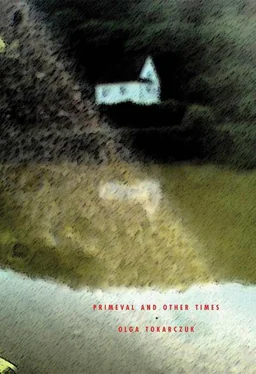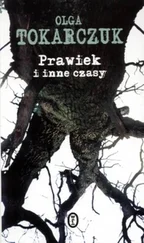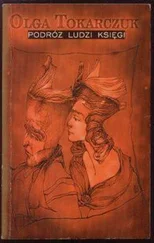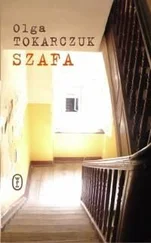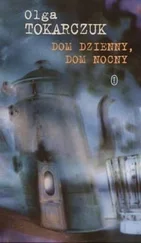“You have to leave the foot, a bit of the foot in the ground,” worried Izydor. “Otherwise they’ll never grow back again.”
“Too bad,” said Misia.
The nights were warm, so they slept on the ground, on quilts brought from home. The men spent all day making dugouts and chopping wood. As in the village, the women cooked and lent each other salt for the potatoes.
The Boskis took up residence between some big pine trees. There were diapers hung out to dry on their branches. Next to the Boskis the Malak sisters had their quarters. The younger one’s husband had joined the Home Army. The older one’s had joined the “Little Andrews” resistance fighters. Paweł and Izydor built the women a dugout.
Without any verbal agreement, the villagers arranged themselves just as they lived in Primeval. They even left an empty space between the Krasnys and Cherubin. In Primeval, Florentynka’s house stands there.
One day at the beginning of September, Cornspike and her daughter came to this forest settlement. The girl was evidently sick. She could hardly drag her feet along. She was bruised and had a high temperature. Paweł Boski, who performed the duties of a doctor in the forest, went up to them with his bag, in which he had iodine, bandages, pills for diarrhoea, and sulfamide powder, but Cornspike wouldn’t let him come near her daughter. She asked the women for hot water and brewed herbs for her. Misia gave them a blanket. It looked as if Cornspike wanted to stay with them, so the men cobbled together a home for her in the ground.
In the evening, when the forest was silent, everyone sat by glimmering bonfires and listened. Sometimes the night flared up, as if a storm were raging nearby. Then they heard a low, terrifying rumble, muffled by the forest.
There were brave people who went to the village, for the potatoes that were ripening in the small home gardens, for flour, or simply because they couldn’t stand living in uncertainty. Old Mrs Serafin, who no longer cared about life, went most often. Sometimes one of her daughters-in-law went with her, and it was from one of them that Misia heard:
“You haven’t got a house any more. There’s just a heap of rubble left.”
Ever since the people from Primeval had run away into the forest and lived there in dugout shelters, the Bad Man could find no place for himself in the forest. People were pushing in everywhere, into every grove, into every clearing. They were digging up peat and looking for mushrooms and nuts. They wandered to one side of their hurriedly established camps to relieve themselves straight onto a strawberry bush or fresh grass. On warmer evenings he could hear them copulating in the bushes. He watched in amazement as they built miserable shelters, and was surprised how much time it took them.
Now he spent all day long watching them, and the longer he looked at them, the more he feared and hated them. They were noisy and deceitful. They never stopped moving their mouths, spouting noises that made no sense. It wasn’t weeping, or shouting, or purring with satisfaction. Their speech didn’t mean anything. Everywhere they left their tracks and their smells behind them. They were insolent and incautious. When the ominous booming noises came, and the sky was coloured red at night, they fell into panic and despair, they didn’t know where to run or where to hide. He could smell their fear. They stank like a rat when it fell into the Bad Man’s trap.
The smells that surrounded them irritated the Bad Man. But among them there were also pleasant, though new odours: the smell of roast meat, boiled potatoes, milk, sheepskins and furs, the smell of coffee made of chicory, ashes, and rye. There were also terrible smells, not animal, but purely human: of grey soap, carbolic, lye, paper, weapons, grease, and sulphur.
One day the Bad Man stood at the edge of the forest and gazed at the village. It was empty, gone cold like carrion. Some of the houses had smashed-in roofs, others had broken windows. There were no birds or dogs in the village. Nothing. This sight pleased the Bad Man. As the people had gone into the forest, the Bad Man went into the village.
In the little book entitled Ignis fatuus, or an instructive game for one player , this is how the description of the Third World begins:
Between Earth and Heaven there are Eight Worlds. They hang motionless in space like eiderdowns hung out to air.
God created the Third World a very long time ago. He started with the seas and volcanoes, and finished with the plants and animals. Yet as there is nothing sublime about creating, just hard work and effort, God grew tired and disheartened. The newly made world seemed boring to Him. The animals couldn’t understand His harmony, they didn’t admire Him or praise Him. They ate and multiplied. They didn’t ask God why He had made the sky blue and the water wet. The hedgehog didn’t wonder at his prickles or the lion at his teeth, the birds didn’t give their wings a second thought.
This world went on for a very long time, and bored God to death. So He went down to Earth and forcibly equipped each animal He met with fingers, hands, faces, soft skin, reason and the capacity to wonder – He changed the animals into people. But the animals didn’t want to be changed into people at all, because people seemed to them as terrible as monsters. So they plotted, caught God, and drowned Him. And that is how it remained.
In the Third World there is no God and no people.
Misia put on two skirts and two sweaters and wrapped her head in a shawl. Silently, to avoid waking anyone, she crept out of the dugout. The forest was muffling the monotonous rumble of distant guns. She took a rucksack and was just about to set off when she saw Adelka. The child came up to her.
“I’m coming with you.”
Misia was cross.
“Go back to the dugout. Right now. I’ll be back in a moment.”
Adelka clutched her skirt tightly and began to cry. Misia hesitated. Then she went back to the dugout for her daughter’s little sheepskin coat.
Once they were standing at the edge of the forest, they thought they could see Primeval. But Primeval wasn’t there. Against the dark sky not the thinnest trail of smoke was visible, there were no lights shining, and no dogs barking. Only in the west, somewhere over Kotuszów, low clouds showed as a brown glow. Misia shuddered and an old dream came back to her, in which it had looked just like this. “I’m dreaming,” she thought. “I’m lying on the bunk in the dugout. I haven’t gone anywhere. This is in my dream.” And then she thought she must have fallen asleep even earlier. It seemed as if she were lying on her new double bed, with Paweł sleeping beside her. There was no war. She was having a long nightmare, about the Germans, the Russians, the front line, the forest, and the dugouts. That helped – Misia stopped feeling afraid and went out onto the Highway. Wet stones on the road crunched under her shoes. Then Misia had a hopeful thought that she had fallen asleep earlier still. Tired of monotonously turning the coffee grinder’s handle, she had fallen asleep on the bench outside the mill. She was only a few years old, and now she was having a child’s dream about adult life and war.
“I want to wake up,” she said aloud.
Adelka looked at her in amazement, and Misia realised that no child would be capable of dreaming the shooting of the Jews, the death of Florentynka, the partisans, what they had done to Ruta, the bombardments, the displacement, or her mother’s paralysis.
She looked upwards: the sky was like the lid of a can, in which God had shut the people.
Читать дальше
